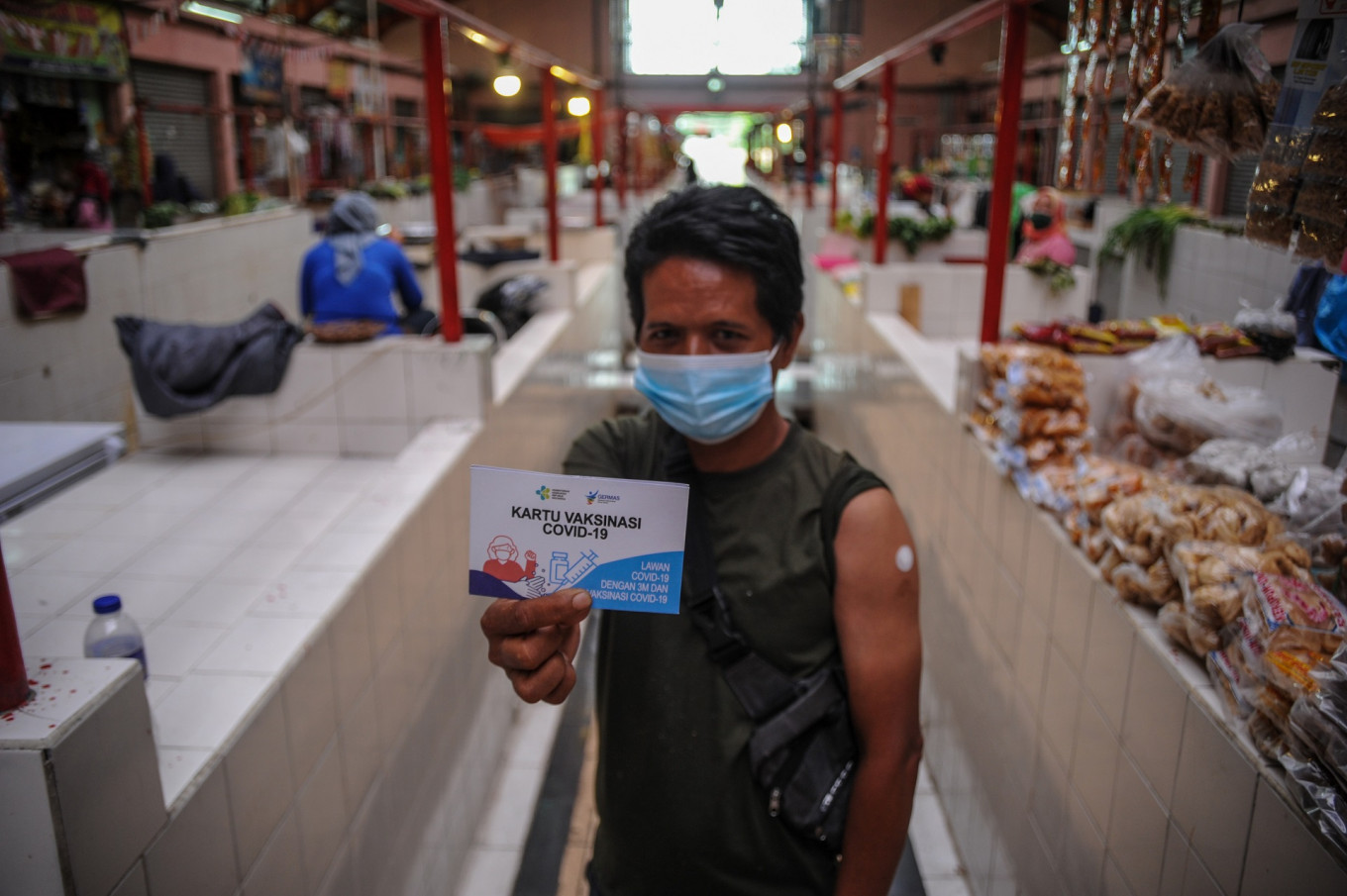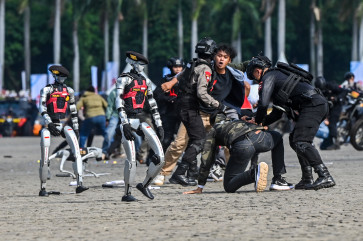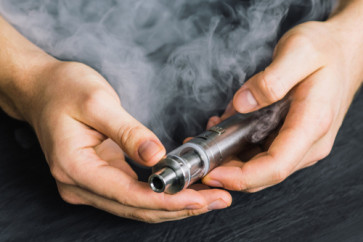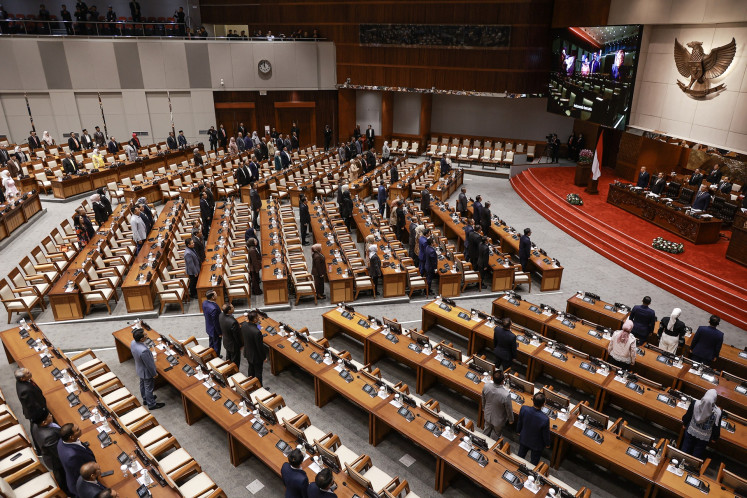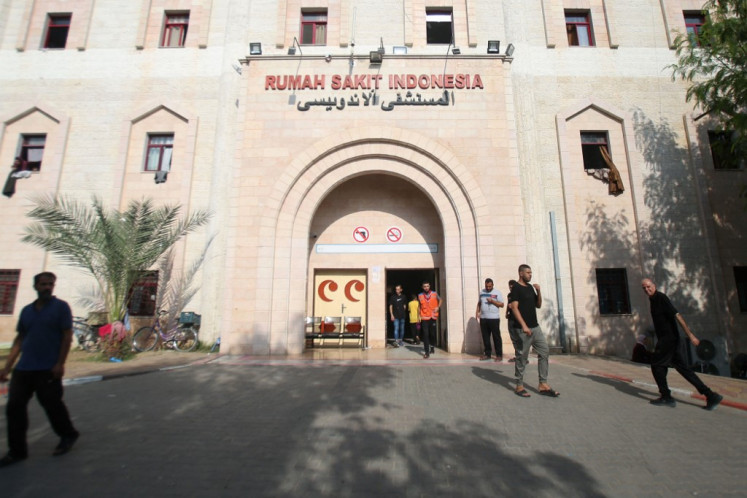Popular Reads
Top Results
Can't find what you're looking for?
View all search resultsPopular Reads
Top Results
Can't find what you're looking for?
View all search results[COMMENTARY] Next government drive: Building vaccine confidence
As Tikki Pangestu, a visiting professor at Singapore’s Lee Kuan Yew School of Public Policy in Singapore, put it, one of the most important and significant barriers to improving vaccine confidence in Asia was the spread of misinformation, falsehoods and conspiracy theories.
Change text size
Gift Premium Articles
to Anyone
A
s vaccination is our only option for beating COVID-19, the prospect of individually purchasing the vaccines offers a glimmer of hope that life can return to normal. It is expected that people will soon be able to buy the vaccines they need this month.
It is also hoped that Indonesia can quickly achieve herd immunity with the addition of the private vaccination program and reduce the burdens on its health system.
But how confident are Indonesians in COVID-19 vaccines?
The government says the private-sector vaccination program, dubbed Gotong Royong (mutual cooperation), will kick off after the vaccine supply has been distributed for inoculating public officials, the elderly and contribution aid recipients (PBIs) of the Health Care and Social Security Agency (BPJS Kesehatan).
During a discussion with the chief editors of several national media on Feb. 17, President Joko “Jokowi” Widodo acknowledged that the private sector had a crucial role to play in providing independent vaccine delivery. By involving private companies in the Gotong Royong program, the President hopes to ease pressures on the state budget and complete the mass vaccination program in less than a year.
What an ambitious target!
Indonesia began its vaccine rollout on Jan. 13, with Jokowi receiving the country’s first COVID-19 jab. The President got his second dose on Jan. 27.
Read also: Indonesia has limited vaccine supplies. Is it prioritizing the right groups?
The nationwide vaccine drive was made possible on Jan. 11, when the Food and Drug Monitoring Agency (BPOM) issued emergency use authorization (EUA) for CoronaVac, the COVID-19 vaccine developed jointly by Chinese pharma giant Sinovac Biotech and state-owned pharmaceutical holding company Bio Farma.
In a press statement on Jan. 11, BPOM head Penny K. Lukito said interim results of the phase III clinical trials showed that CoronaVac was safe and had relatively minor side effects. The interim results also showed that CoronaVac had 65.3 percent efficacy, above the World Health Organization’s 50 percent threshold.
As the first to receive a dose of the COVID-19 vaccine, President Jokowi delivered a clear message to the Indonesian public that all those who were offered the vaccine should take it.
Of course, he wants the public to trust the vaccine. Targeting vaccination coverage of 181 million citizens would be doomed to failure if the public had no confidence in the vaccine.
Vaccine confidence is a public health concern because immunization is an integral part of global efforts to keep infectious diseases at bay. Life time immunization is now achievable, and it is vital for the government to ensure that the public has adequate information on this.
We would all agree that it is not the sole responsibility of healthcare professionals to drive the conversation on why immunization matters. Although the public usually relies on their advice, successful mass immunization needs greater, cross-sector involvement.
One of the major barriers to immunization programs is fear over potential adverse reactions to a vaccine. This is why a communication campaign on COVID-19 vaccines is imperative to public health education. People need to know what the COVID-19 vaccine is, how it works and possible adverse effects to it.
We should not ignore the power of social media in promoting the mass vaccination program, either. The information spread on social media is not always accurate, and it’s hard to separate the chaff from the grain.
As Tikki Pangestu, a visiting professor at Singapore’s Lee Kuan Yew School of Public Policy in Singapore, put it, one of the most important and significant barriers to improving vaccine confidence in Asia was the spread of misinformation, falsehoods and conspiracy theories.
“These have created fear, confusion and reduced public trust in the importance of vaccination,” Tikki told the “Vaccine confidence in the time of COVID-19: Asia’s time to act” webinar, held by the EU-ASEAN Business Council last December.
Read also: Get vaccinated or lose your social aid, Indonesian government says
Like many other countries, Indonesia has found it difficult to deal with social media, an active battleground between anti- and pro-vaccination groups.
What worries me most is that the “anti-vaxxers” are much more internet savvy, are better at using a diverse range of communication platforms, and post more compelling messages than the “pro-vaxxers”.
Like it or not, we must admit that public health experts tend to be monotonous. They like using data and graphs, which don’t convince as well as personal narratives. According to Tikki, this is why the government needs to be more tech-savvy in reaching all groups of people.
Vaccine misinformation that targets religious communities, which has been growing in popularity on social media, is also worrying. Religious sentiments are spreading in almost all areas of Asia.
Zulkifli Ismail, secretary-general of the Asia Pacific Pediatric Association and a pediatric cardiologist at Selangor Specialist Hospital, presented Malaysian Health Ministry data at the webinar, showing the growing trend of vaccine refusal in rural areas in 2013-2019. The prevailing belief in Islamic states like Keddah on Malaysia’s eastern coast is that getting immunized is very un-Islamic.
This phenomenon is also happening in Indonesia. According to the Health Ministry’s 2018 Basic Health Survey (Riskesdas), sustained vaccination coverage in Aceh, which implements sharia, reached only 19 percent of children aged 23-34 months. Religious reasons were blamed for the massive vaccine refusal in the province.
The government needs to do much more to improve vaccine confidence in the country to achieve herd immunity.
Not everyone is anti-vaccination and the majority is simply undecided. This group includes tech-savvy youths who could reach out to influence many online communities to become pro-vaccination – with a little push from the government in the right direction.
***
Staff writer at The Jakarta Post

